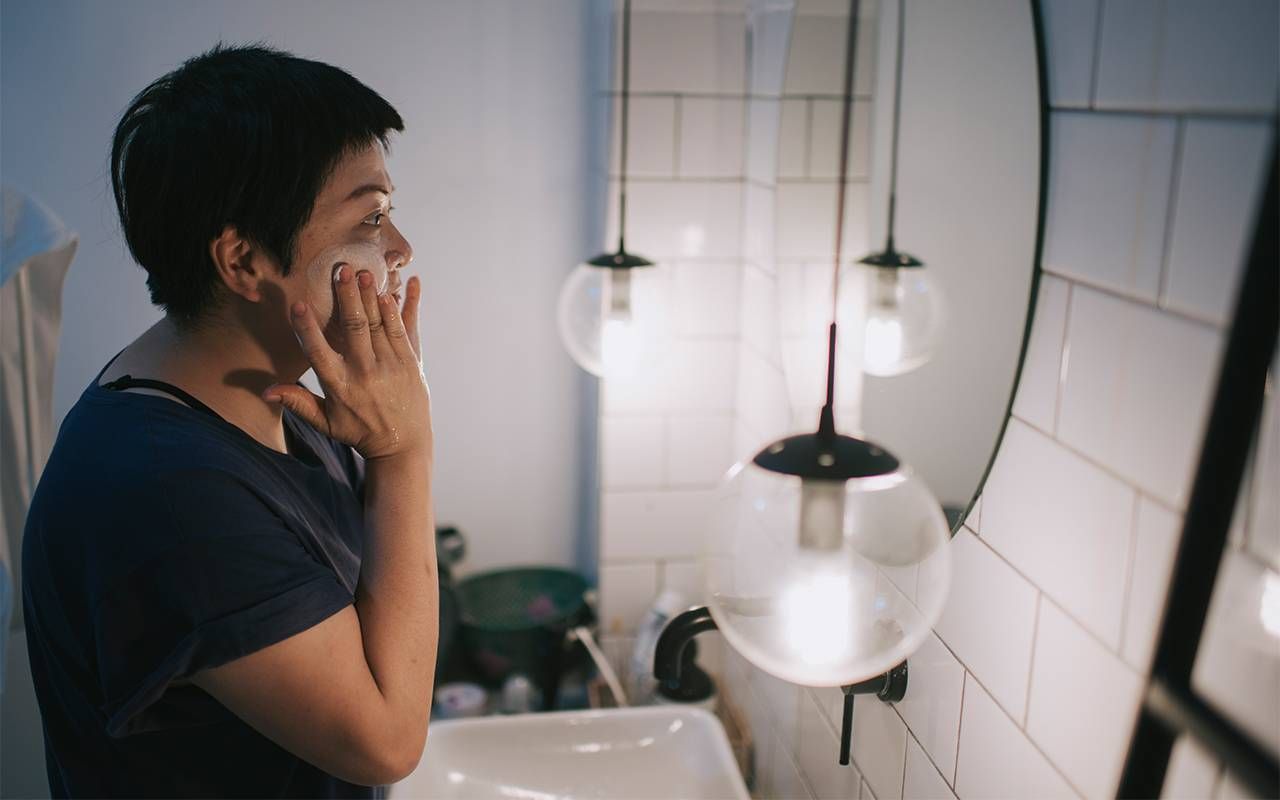Do You Have Menopausal Acne?
Hormonal imbalance can cause menopausal acne, but topical and oral medicines and lifestyle management can help
Menopausal acne is a type of hormonal acne that can occur during perimenopause and menopause. Hormonal changes during this time cause the skin's sebaceous glands to secrete sebum (oil), which can trigger acne.
"Hormonal acne is a type of acne that has a particular pattern, characterized by deep-seated papules and nodules occurring primarily on the chin, lateral face, jawline, neck and hairline," says Mallory Abate, a Baton Rouge, Louisiana board-certified dermatologist.

The lesions, which can be profound and often painful, "is very different from the superficial whiteheads and blackheads occurring in the central T-zone of the face," Abate adds.
For a woman experiencing hormonal acne during menopause, switching to a low-glycemic diet could be beneficial.
The Role of Androgens
Androgens (male sex hormones) play a significant role in menopausal acne. "The pathogenesis of acne is complex, but one key driver is androgens which cause our sebaceous glands to secrete sebum," says Abate, explaining that oil builds up in the hair follicle which leads to bacterial overgrowth, inflammation and an acne nodule.
"I tend to think of androgens and estrogen at opposite ends of the court," Abate notes. Androgens tend to cause acne, while estrogens protect against it. "As women, we produce androgens in our ovaries and adrenal glands. Our ovaries primarily produce our estrogen."
The ovaries stop making estrogen during menopause, and the levels drop drastically, while androgen levels decrease more slowly. "So, during menopause, there is a relative androgen excess, which can lead to hormonal acne," Abate explains.
Menopausal Acne Triggers
Several lifestyle factors can trigger menopausal acne or worsen it, including stress, lack of sleep or exercise, weight, insulin resistance, diet, frequent alcohol consumption and spicy foods.
Abate says some research "suggests that foods with a high glycemic index (white bread, white rice, chips, fries, donuts, processed foods and sugary drinks) may contribute to acne. "Foods with a high glycemic index cause your blood sugar to spike, and when blood sugar spikes, it causes inflammation in your body," she says.
Sugar spikes cause the skin to produce more sebum, and excess inflammation and sebum can cause acne. "So, for a woman experiencing hormonal acne during menopause, switching to a low-glycemic diet could be beneficial," Abate explains.
A Word About Testosterone
Abate says that while doctors often prescribe HRT (hormone replacement therapy) containing estrogen and progesterone for menopausal symptoms like hot flashes, "there is no clear indication for the use of testosterone nor is there an FDA-approved testosterone formulation for women in the U.S."
Abate cautions that dermatologists have noticed an increase in women using testosterone supplementation off-label (when a doctor prescribes a drug for a condition that it hasn't officially been approved for), often for low libido. Since testosterone is a significant cause of acne, this off-label use could contribute to menopausal acne.
Current and Promising Treatments
Menopausal acne treatments are usually hormonal, Abate says, and "because the lesions are deep-seated papules and nodules, they are often times too deep for a topical medicine alone to be effective and usually require oral therapy."
Abate suggests several treatment options. She finds spironolactone, an androgen receptor antagonist, effective against menopausal acne and says that sometimes anti-inflammatory antibiotics can "help alleviate acne flares in the short-term."
Often times flares for menopausal acne can be caused by the same triggers that may trigger a hot flash.
Abate may also prescribe oral contraceptives or HRT, or isotretinoin. "If the acne is refractory (has not responded to treatment), prescription isotretinoin can be very effective and life-changing for many patients," she adds.
If a woman wants to avoid oral medicine, Abate may prescribe a topical called clascoterone, an androgen receptor inhibitor that is usually well-tolerated and works like oral spironolactone.
Alison Freiman, who lives in Binghamton, New York, developed acne as a teenager. It subsided when she became an adult. Freiman, now 52 and a year into menopause, started noticing pimples on her face a few months ago. She recently saw a dermatologist who diagnosed her with menopausal acne and prescribed an anti-inflammatory antibiotic cream.
Tips to Manage Menopausal Acne
You may find it helpful to ask your dermatologist whether you can wear makeup or use moisturizer if you have menopausal acne, what you can do to manage your acne, and what you need to know about treatment side effects. In general, to help manage your menopausal acne, try to:
· Reduce stress
· Eat a healthy diet
· Develop a skincare routine with your doctor's advice
· Get enough sleep
Abate suggests if a woman is having other menopausal symptoms in addition to acne, she should see a board-certified ob-gyn doctor. "Often times flares for menopausal acne can be caused by the same triggers that may trigger a hot flash. So, avoiding things like alcohol, hot drinks (like coffee), long hot baths, spicy foods and sunbathing is a good start."

